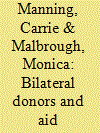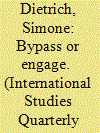| Srl | Item |
| 1 |
ID:
101151


|
|
|
|
|
| Publication |
2010.
|
| Summary/Abstract |
This article examines the role of bilateral donors and conditional aid in Mozambique's successful post-war peace process. The literature on peacebuilding has tended to privilege the role of UN missions in explaining the outcomes of post-civil war peace processes. The important role that bilateral donors may play in determining these outcomes has not been thoroughly studied. In Mozambique, donors with country experience, knowledge of domestic political actors and constraints, and a shared commitment to a successful outcome, were indispensable to the success of the peace process. The article details this engagement, arguing that it was not UNOMOZ alone, but UNOMOZ as supported by the flexible responses of these donors, that provided an effective third-party guarantee of the peace agreement in Mozambique. It briefly discusses the broader implications of this finding for understanding international peacebuilding efforts.
|
|
|
|
|
|
|
|
|
|
|
|
|
|
|
|
| 2 |
ID:
126516


|
|
|
|
|
| Publication |
2013.
|
| Summary/Abstract |
The conventional wisdom in the literature on aid allocation suggests that donors utilize bilateral aid as a tool to buy influence in the aid-receiving country. Those who conclude that aid is driven by donor self-interest focus on government-to-government aid transfers. However, this approach overlooks important variation in delivery tactics: Bilateral donors frequently provide aid to nonstate actors. This paper argues that donors resort to delivery tactics that increase the likelihood of aid achieving its intended outcome. In poorly governed recipient countries, donors bypass recipient governments and deliver more aid through nonstate actors, all else equal. In recipient countries with higher governance quality, donors engage the government and give more aid through the government-to-government channel. Using OLS and Probit regressions, I find empirical support for this argument. Understanding the determinants of donor delivery tactics has important implications for assessing aid effectiveness.
|
|
|
|
|
|
|
|
|
|
|
|
|
|
|
|
| 3 |
ID:
156712


|
|
|
|
|
| Summary/Abstract |
The rapid growth of trust funds at multilateral development organizations has been widely neglected in the academic literature. We examine sovereign donors' choices among various trust fund options and contend that the choice among the different trust funds involves a fundamental trade-off: larger funds provide donors with “burden-sharing” benefits, but each donor can better assert its individual preferences in a fund with fewer other donors. The theoretical considerations yield testable hypotheses on a range of factors affecting this fundamental trade-off, most notably the area of the trust fund's intervention and donor countries' competing domestic interests. A large-N analysis of participation decisions of OECD/DAC donors in trust funds over the past decade mostly corroborates these hypotheses. In particular, ex ante preference alignment among donors as well as indicators for global activities and fragile states aid are robust determinants of participation in (large) multi-donor funds. In contrast, a donor tends to prefer a single-donor fund in areas where its national interests dominate.
|
|
|
|
|
|
|
|
|
|
|
|
|
|
|
|